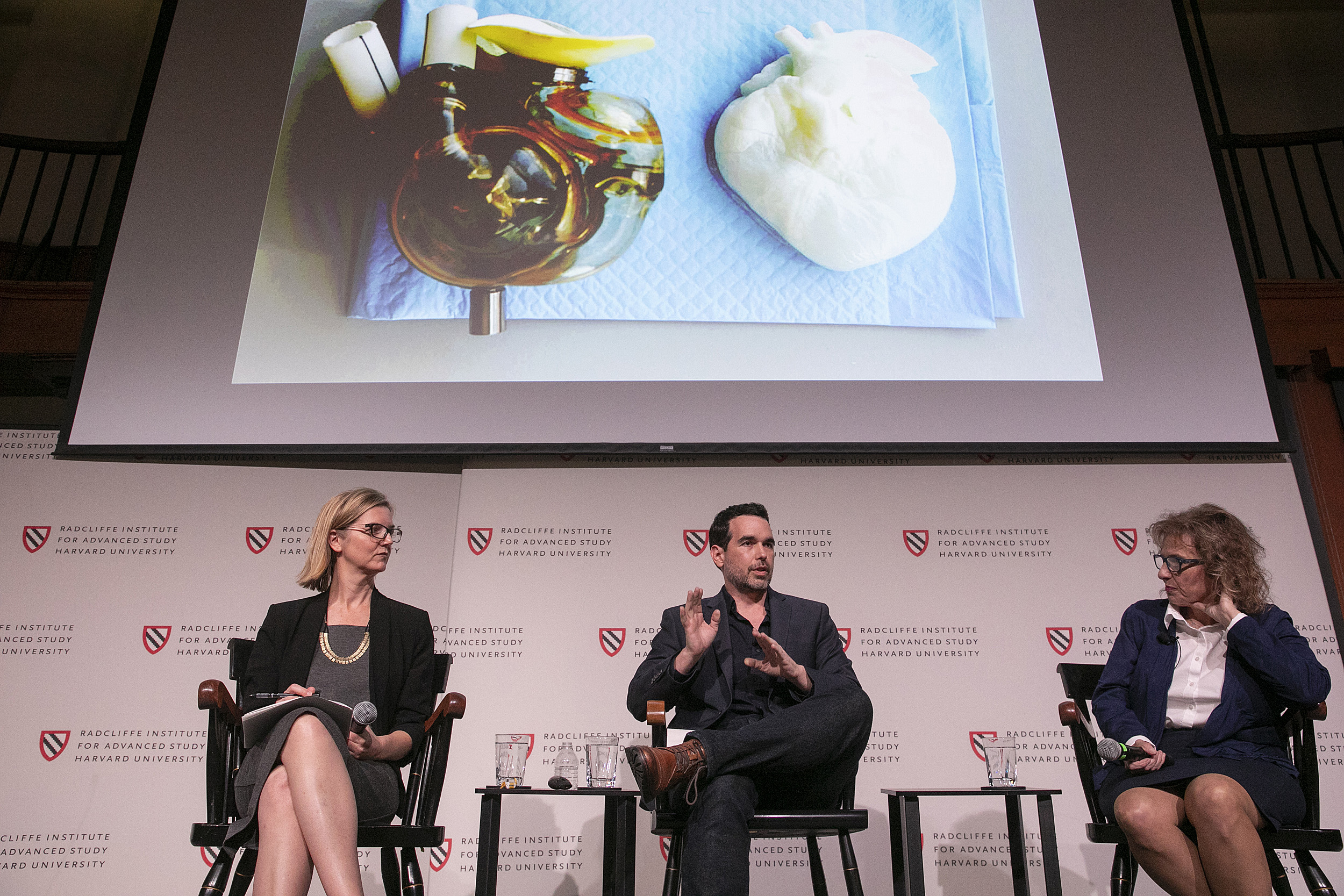
Professor Jennifer L. Roberts (from left), artist Dario Robleto, and medical researcher Doris A. Taylor.
Jon Chase/Harvard Staff Photographer
The heart of the matter
A transdisciplinary artist and a transplant researcher discuss the biology, imagery, and symbolism of a very vital organ
Doris A. Taylor’s so-called replacement “ghost heart” suggests something otherworldly, but the eerie-looking form is far from an apparition. It’s an innovative approach to organ transplantation that has inspired many in the medical community — and at least one artist.
The Texas researcher’s process piggybacks on nature’s sophisticated design. Together she and a team of researchers strip cells off human and animal cadaver hearts with a soapy solution, leaving ghostly white protein shells that retain the form of the organ. They inject them with a patient’s blood or bone-marrow stem cells, and the ghost hearts act as scaffolding on which the newly introduced cells can slowly transform into a beating muscle.
“What we said was, ‘Wouldn’t it be really cool if we could wash the sick cells out and put the healthy cells back in?’” said Taylor, director of Regenerative Medicine Research and director of the Center for Cell and Organ Biotechnology at the Texas Heart Institute, during a recent talk at the Radcliffe Institute for Advanced Study.
The hope is that one day these regenerated hearts will resolve the most challenging issues transplant patients currently face: the lack of a permanent artificial replacement, concerns about rejection, and the shortage of viable donor hearts.
Taylor’s efforts are driving what could become a revolution in organ transplants, and they have sparked the creativity of transdisciplinary artist Dario Robleto, whose latest work, on view at the Johnson-Kulukundis Family Gallery in Radcliffe’s Byerly Hall, recreates in images and sounds the original pulse wave of the heart first captured in visual form by scientists in the 1900s. Robleto and Taylor, longtime friends and Texas residents, explored those connections during Monday’s Radcliffe discussion, which was moderated by Jennifer Roberts, Elizabeth Cary Agassiz Professor of the Humanities.
Robleto’s exhibit, “Unknown and Solitary Seas,” touches on the overlap between the medical mysteries and workings of the vascular pump, and the metaphor for the heart as the emotional center of the soul. It includes a video installation that features recreated sounds of a beating heart from the 19th century, reconstructed images of how the earliest pulse waves first appeared on the page, and a series of heart waveform sculptures in brass-plated stainless steel.
Roberts said that with his work, Robleto acknowledges the pulse waves’ “promise, their profundity, their scientific value, but he also reclaims some of their ambiguity and asks us to wonder whether we can or should accept that these waveforms have escaped the realms of art, culture, and emotional communication.”
Taylor similarly views her work as a blend of the scientific and the human. It transcends complicated, complex science, she says, in that her ghost hearts require a kind of passion, commitment, care, attention, and nurturing similar to what’s required by a small child. “It’s really about building hearts at the emotional, mental, spiritual, and physical level that I think is going to get them to work,” she said.
For Robleto, big ideas, like the creation of a new human heart, require multiple perspectives.
The artist called Taylor’s work “one of the most fascinating and definitely one of the most emotional things I’ve ever seen.” As an object, he added, the ghost heart is “stunningly beautiful” but it also raises questions about the self, identity, emotion, the notions of form and where memory is truly held, questions he thinks artists can help address. He cited two of the nation’s earliest heart transplants, after which the patients’ wives asked their husbands, who had received donor hearts, if they still loved them.
Taylor’s work, Robleto said, is “right at the edge of identity and materiality and so when the day comes when someone says ‘the first ghost heart transplant’ I think we will have a similar moment where perhaps we will be forced to re-evaluate what we ask from our heart metaphor.”
Dario Robleto’s “Unknown and Solitary Seas” is on view in Byerly Hall’s Johnson-Kulukundis Family Gallery through Jan. 18, 2020.




